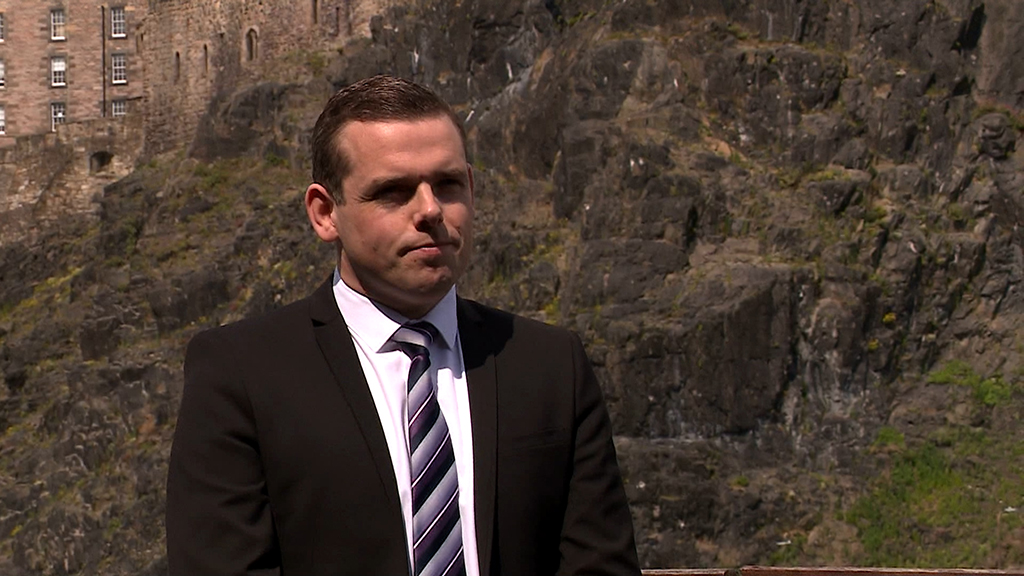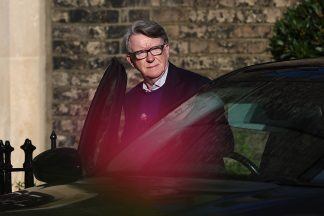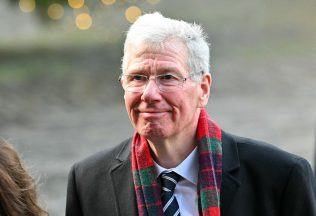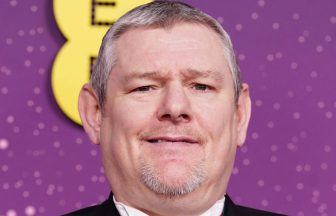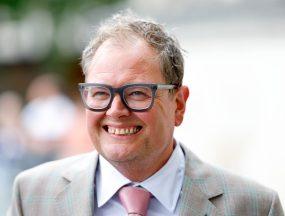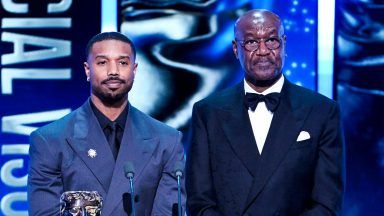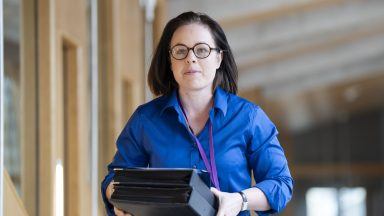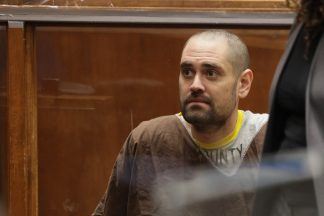The new leader of the Scottish Conservatives is aiming to replace Nicola Sturgeon as First Minister at next May’s Holyrood election.
Douglas Ross was speaking to presenter John MacKay on STV current affairs show Scotland Tonight on Monday.
He said he believes his party can provide a realistic alternative to the SNP, despite trailing in the opinion polls. The 37-year-old MP for Moray – who replaced Jackson Carlaw as leader in August – also spoke about Brexit and the impact of a potential no-deal scenario.
John MacKay: The Prime Minister has indicated that he is ready to walk away from negotiations with a no-deal on Brexit, that would be a disaster for the union, would it not?
Douglas Ross: The Prime Minister has been clear at the timeframe facing both the UK and EU negotiators and if we don’t reach an agreement through talks this month and by the next EU council on October 15 then we have to have that deadline.
But I am reassured from everything I have heard from the Prime Minister that he and the UK Government are determined to get a deal as we leave the transition period and I think there is a lot of effort now to ensure that the EU see the strong position that we are putting forward and the fact we are simply calling for what has been delivered in other deals around the world.
JM: But the Prime Minister seems to believe that no-deal actually might not be a bad thing for the United Kingdom.
DR: Well there are obviously opportunities to trade freely around the world, there’s great benefits to our fishing industry in the north east of Scotland and many parts of the country for fisherman and fishing communities to move forward and constrain from the hated common fishing policy that we have seen for the last 40 years.
JM: But might that be at the cost of the union?
DR: No, I believe that this is a strong deal we can get for the United Kingdom and I believe that is where the efforts of the UK Government remain to be focused on, but we have to be realistic that time is running out and, as I said before, if someone told me in September that we would have both sides saying ‘we need to move on’ then I’d not be surprised the negotiations have gone right to the wire.
But the Prime Minister is quite right to say that if we don’t have an agreement at the EU council on October 15 then it will be very difficult to get that through by the end of the transition period.
JM: The two sticking points appear to fishing and state aid, where do you think the UK Government could compromise on either of these, fishing?
DR: Well definitely not on fishing and there is no need to compromise on either, we have put through a very strong case on both of these issues and, as I said here in parliament last week, I think it was disrespectful from the SNP for so many fishing communities that they voted against fishing legislation that we are putting through here. The first time in 40 years that we are going to be an independent fishing state to benefit fishing communities the length and breadth of the country and to see these opportunities realised as we leave the European Union by the end of the transition period in December.
JM: That suggests that if there is to be any compromise from the UK it will be in state aid? Or will the compromise have to come from the EU then?
DR: Well, we have sent out a very clear message in our negotiations all the way through this and we are not asking for anything extra than has already been delivered by the EU in other deals that they have negotiated around the world.
JM: Reports today regarding Brexit that the UK is prepared to unilaterally change the customs arrangement for Northern Ireland, what do you think of that?
DR: I think Number 10 and the Prime Minister have been very clear that these are small clarifications that are effectively a safety net, we are still continuing the discussion with the joint council and European Union, but it is right that we prepare for all eventualities and it’s important that these small corrections and clarifications are in place to preserve the peace that we so rightfully cherish in Northern Ireland.
JM: What does it say about a government that are trying to change an agreed deal?
DR: Well it’s not, areas that were always going to have to be negotiated through the mechanisms in place, I still think that can be done and efforts are underway to ensure that it is agreed in that way, but it is also responsible of the government to look to have a safety blanket and backup measures should the first choice and areas we are negotiating on at the moment prove to be unsuccessful.
JM: This is your first appearance on Scotland Tonight as Scottish Conservatives leader, what is your aim ultimately, is it to be First Minister, is it to prevent a second independence referendum?
DR: It is to be First Minister, I believe I have the policies behind me that Scottish Conservatives and people across Scotland will see as an alternative to the SNP after 13 years and, while the nationalists want to take us back to the division of the past, I want to look at what Scotland can do with the powers it has over the next five years to improve the education system, our health service, the economy, rebuild after the recession after the pandemic to ensure we have jobs in all communities to really take Scotland forward over the next five-year parliament.
JM: Do you seriously think you could be First Minister despite everything the polls suggest and despite the current seats in Holyrood and the turnaround required for that, and polls even suggesting the SNP could have a majority of 20 seats next year – are you seriously saying you could be First Minister?
DR: Yes, yes I am and I am ambitious about the opportunities of Scottish Conservatives and for the party I am leading into elections next year, we have to be ambitious and we have to make it clear there is an alternative to the SNP, who have let Scotland down after more than a decade in power, 13 years of not delivering for Scotland and instead of being focused on constitutional wrangling and picking fights with Westminster. Let’s look at the alternative with ideas I am bringing forward on the economy, for jobs, for education, these are areas that people across Scotland and opinion polls tell us these are the issues they want us to focus on ahead of the election next May.
JM: It’s all very well being ambitious but you have to be realistic as well. Would it be the case that if you manage to prevent an SNP majority that would prevent a second independence referendum you would think ‘job well done’?
DR: I am telling you and I will now say it for a third time that I am in this to win it and I think every political leader in Scotland should be ambitious with the programme they are putting to the people next May, that’s what I am doing in my listening exercises across the country and we have a manifesto that reflects Scotland and reflects the ambitions of Scotland that I will be putting to the country next year.
Follow STV News on WhatsApp
Scan the QR code on your mobile device for all the latest news from around the country


